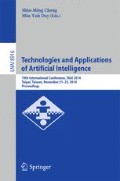Abstract
Monte-Carlo Tree Search (MCTS) is a powerful paradigm for perfect information games. When considering stochastic games, the tree model that represents the game has to take chance and a huge branching factor into account. As effectiveness of MCTS may decrease in such a setting, tree reductions may be useful. Chance-nodes are a way to deal with random events. Move-groups are another way to deal efficiently with a large branching factor by regrouping nodes. Group-nodes are regrouping only reveal moves and enable a choice between reveal moves and classical moves. We present various policies to use such reductions for the stochastic game Chinese Dark Chess. Move-groups, chance-nodes and group-nodes are compared.
Access this chapter
Tax calculation will be finalised at checkout
Purchases are for personal use only
Preview
Unable to display preview. Download preview PDF.
References
Yen, S.-J., Chou, C.-W., Chen, J.-C., Wu, I.-C., Kao, K.-Y.: The Art of the Chinese Dark Chess Program DIABLE. In: Chang, R.-S., Jain, L.C., Peng, S.-L. (eds.) Advances in Intelligent Systems & Applications. SIST, vol. 20, pp. 231–242. Springer, Heidelberg (2013)
Chen, B.-N., Hsu, T.-S.: Automatic Generation of Chinese Dark Chess Opening Books. In: 8th Int. Conf. on Computers and Games (CG 2013) (2013)
Chen, J.-C., Lin, T.-Y., Hsu, S.-C., Hsu, T.-S.: Design and Implementation of Computer Chinese Dark Chess Endgame Database. In: TCGA Computer Game Workshop (TCGA 2012) (2012)
Saffidine, A., Jouandeau, N., Buron, C., Cazenave, T.: Material Symmetry to Partition Endgame Tables. In: 8th Int. Conf. on Computers and Games (CG 2013) (2013)
Chen, J.-C., Lin, T.-Y., Chen, B.-N., Hsu, T.-S.: Equivalence Classes in Chinese Dark Chess Endgames. IEEE Trans. on Computational Intelligence and AI in Games (TCIAIG-2014) (2014)
Chang, H.-J., Hsu, T.-S.: A quantitative study of 2 × 4 chinese dark chess. In: van den Herik, H.J., Iida, H., Plaat, A. (eds.) CG 2013. LNCS, vol. 8427, pp. 151–162. Springer, Heidelberg (2014)
Chen, B.-N., Shen, B.-J., Hsu, T.-S.: Chinese Dark Chess. ICGA Journal 33(2), 93 (2010)
Ballard, B.W.: The *-minimax search procedure for trees containing chance nodes. Artifical Intelligence 21, 327–350 (1983)
Jouandeau, N., Cazenave, T.: Small and large MCTS playouts applied to Chinese Dark Chess stochastic game. In: ECAI 3th Int. Computer Games Workshop 2014 (CGW 2014) (2014)
Childs, B.E., Brodeur, J.H., Kocsis, L.: Transpositions and move groups in Monte Carlo tree search. In: IEEE Symp. On Computational Intelligence and Games (CIG 2008), pp. 389–395 (2008)
Cowling, P.I., Powley, E.J., Whitehouse, D.: Information Set Monte Carlo Tree Search. IEEE Trans. on Computational Intelligence and AI in Games 4(2), 120–143 (2012)
Van Eyck, G., Müller, M.: Revisiting move groups in monte-carlo tree search. In: van den Herik, H.J., Plaat, A. (eds.) ACG 2011. LNCS, vol. 7168, pp. 13–23. Springer, Heidelberg (2012)
Lanctot, M., Saffidine, A., Veness, J., Archibald, C., Winands, M.: Monte Carlo *-Minimax Search. In: 23rd Int. Joint Conf. on Artificial Intelligence (IJCAI 2013) (2013)
Van Lishout, F., Chaslot, G., Uiterwijk, J.W.H.M.: Monte-Carlo Tree Search in Backgammon. In: Int. Computer Games Workshop (CGW 2007), pp. 175–184 (2007)
Sheppard, B.: World-championship-caliber Scrabble. Artificial Intelligence 134, 241–275 (2002)
Billings, D., Davidson, A., Schaeffer, J., Szafron, D.: The Challenge of Poker. Artificial Intelligence 134, 201–240 (2002)
Author information
Authors and Affiliations
Editor information
Editors and Affiliations
Rights and permissions
Copyright information
© 2014 Springer International Publishing Switzerland
About this paper
Cite this paper
Jouandeau, N., Cazenave, T. (2014). Monte-Carlo Tree Reductions for Stochastic Games. In: Cheng, SM., Day, MY. (eds) Technologies and Applications of Artificial Intelligence. TAAI 2014. Lecture Notes in Computer Science(), vol 8916. Springer, Cham. https://doi.org/10.1007/978-3-319-13987-6_22
Download citation
DOI: https://doi.org/10.1007/978-3-319-13987-6_22
Publisher Name: Springer, Cham
Print ISBN: 978-3-319-13986-9
Online ISBN: 978-3-319-13987-6
eBook Packages: Computer ScienceComputer Science (R0)

